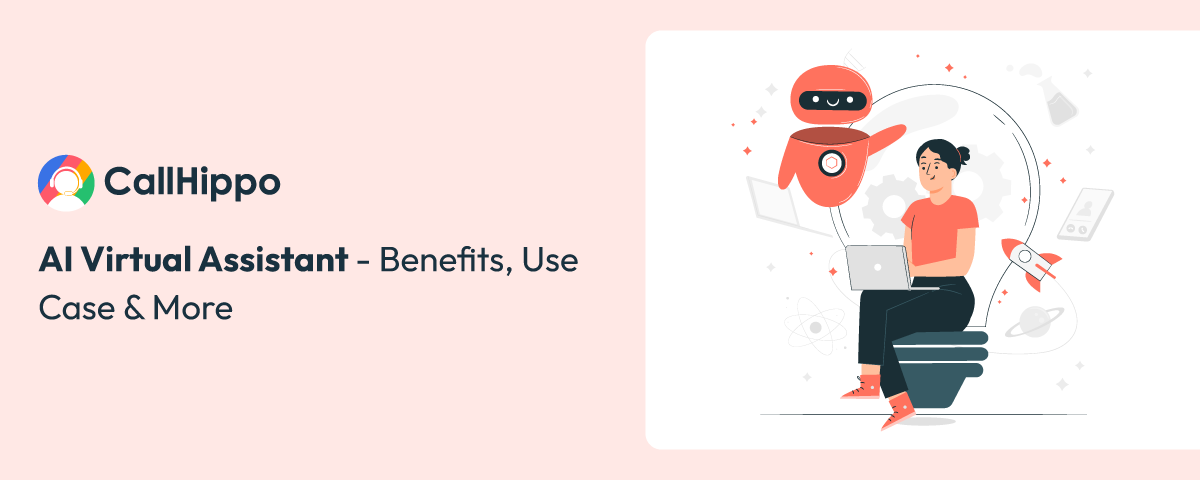The rapid advancements in Artificial Intelligence (AI) are transforming the way businesses and individuals operate. One of the most groundbreaking technologies to emerge is the AI virtual assistant. Whether you’re looking for an AI-powered virtual assistant to help with daily tasks, manage customer queries, or even provide voice-guided solutions, this technology is becoming indispensable across various sectors.
In this blog, we’ll delve deep into what an AI virtual assistant is, the benefits it offers, its applications in various industries, and how to choose the right one. We’ll also introduce some of the most popular AI virtual assistant apps available today.
What is an AI Virtual Assistant?
An AI virtual assistant is a software application designed to mimic human interaction and perform tasks based on voice commands or text queries. These assistants use advanced technologies like natural language processing (NLP), machine learning, and deep learning to understand and respond to human requests.
A well-designed AI virtual assistant software can automate repetitive tasks, enhance productivity, and provide seamless customer support across multiple industries.
When selecting an AI virtual assistant, prioritize functionality and seamless integration with your existing tools to ensure it meets your specific needs. Additionally, consider data privacy and user-friendliness to enhance both security and ease of use. Customization is key for a personalized experience, especially in professional environments.
5 Best Conversational AI Virtual Assistants for Businesses
Conversational AI virtual assistants streamline communication, automate tasks, and enhance user experience. These AI tools serve various industries, from support centres to internal teams. Each platform brings unique strengths based on use case and scale. Below are the top five solutions in 2025.
1. CallHippo AI Voice Agent
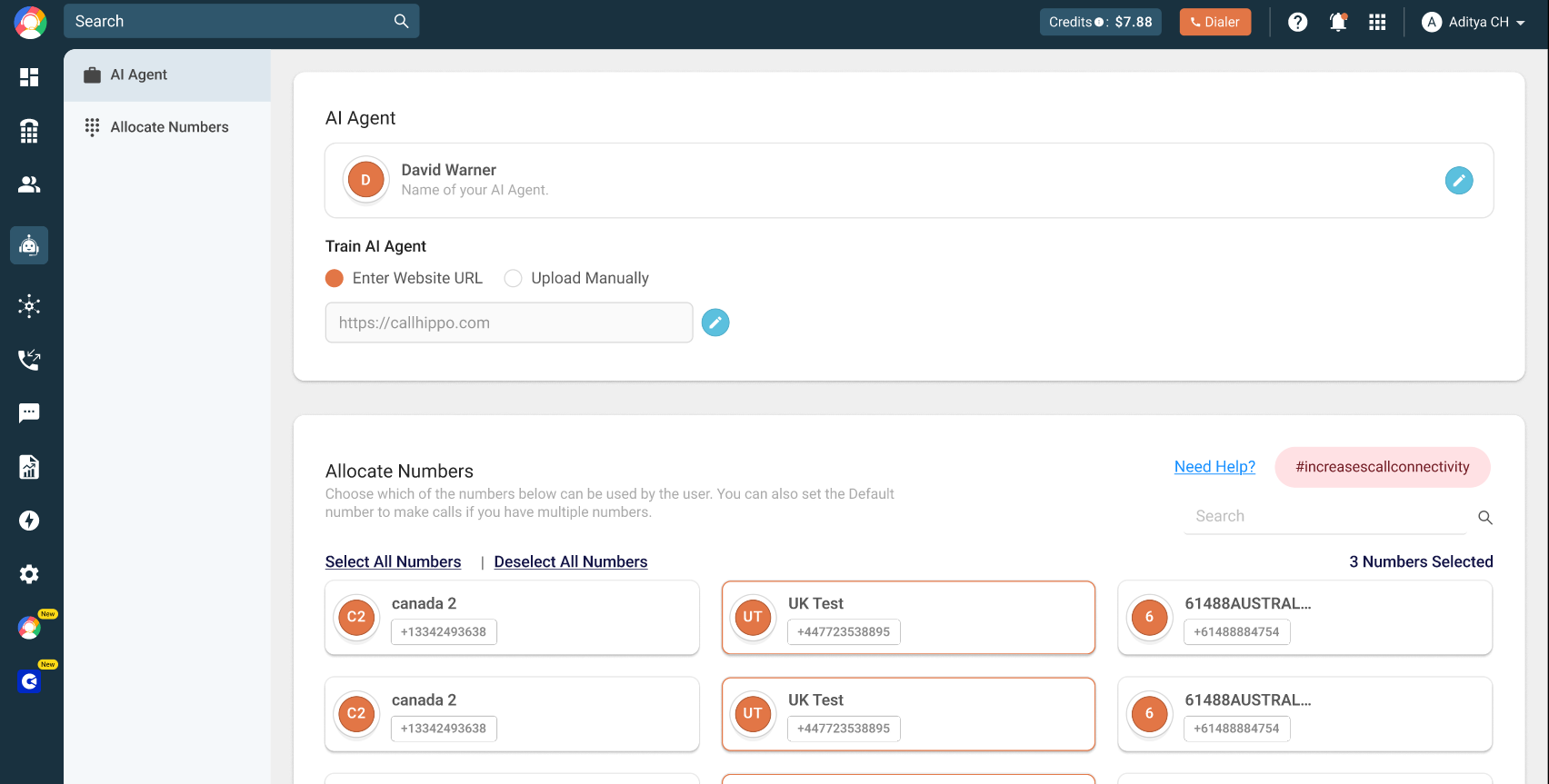
CallHippo AI Voice Agent offers smart voice automation for businesses. It answers customer calls, handles queries, and routes calls efficiently. Designed for 24/7 support, it ensures round-the-clock availability. It’s a strong fit for teams prioritizing voice-based customer interaction.
Key Focus
- Voice-based customer support automation for global and growing teams.
Key Features
- Omnichannel Support
- Sentiment & Intent Analysis
- Smart Call Routing
- Multilingual Support
- CRM & Helpdesk Integration
- Easy setup and use with minimal training needed.
- Scales easily for growing global support operations.
- High call clarity and consistent performance.
- Limited to voice; no live chat support.
- Lacks deep analytics for complex reporting.
With CallHippo AI Voice Agent
- 24/7 Inbound Call Handling
- Context-Aware Responses
- Intelligent Call Routing
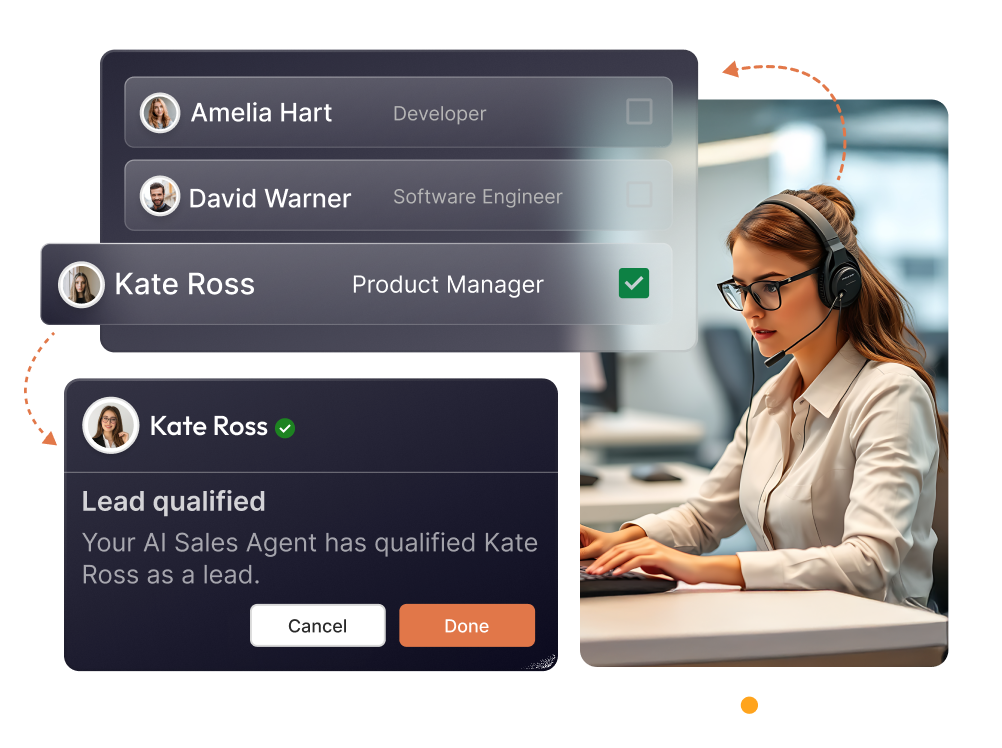
2. Cognigy.AI Platform
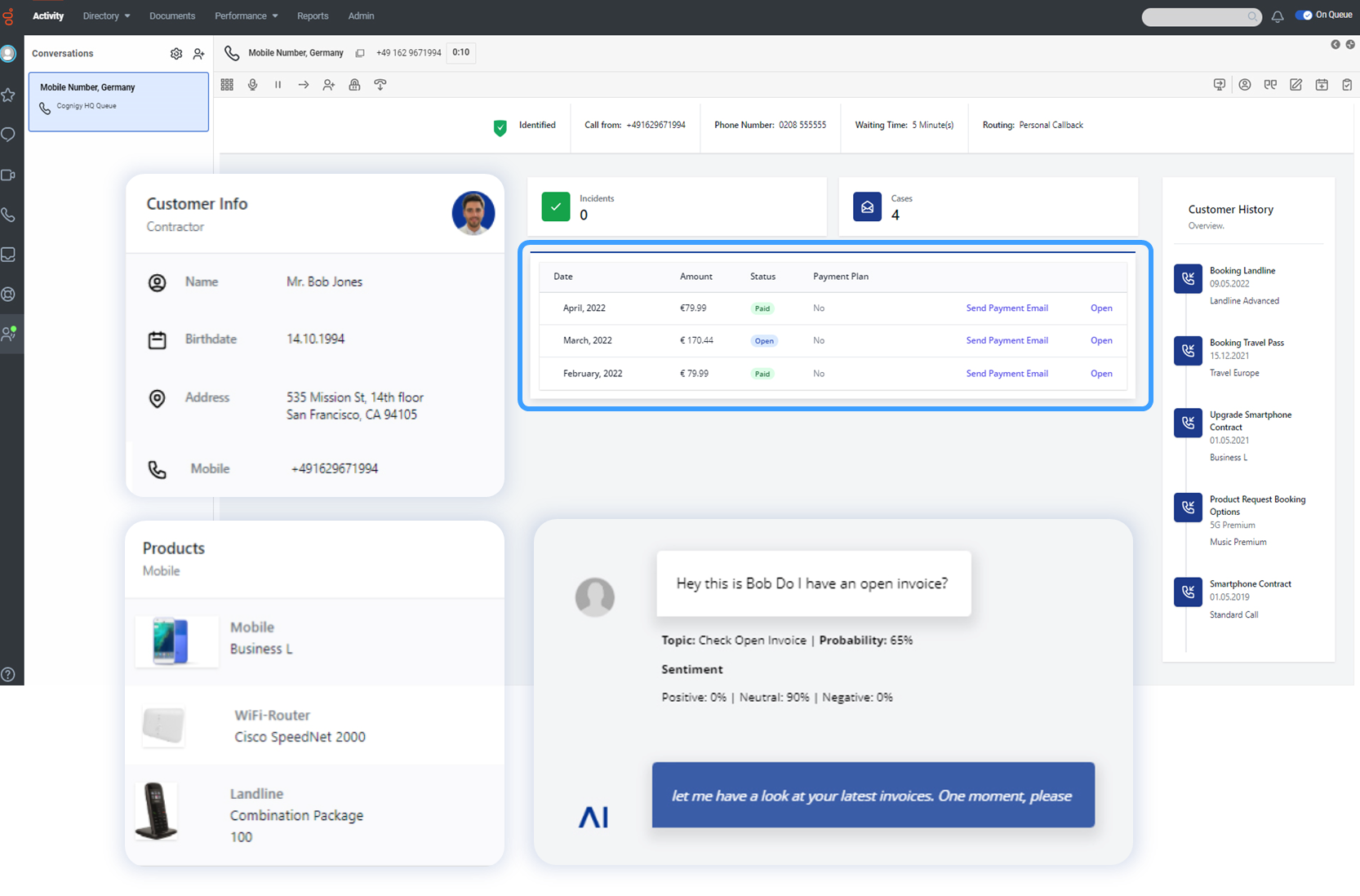
Cognigy.AI is a robust platform built for conversational automation. It supports both voice and chat, enabling businesses to deliver omnichannel service. Its flow builder allows non-tech teams to design conversations easily. Ideal for enterprises seeking global-scale support.
Key Focus
- Omnichannel conversational automation with low-code bot building.
Key Features
- Flow Builder
- Omnichannel Support
- Analytics & Reporting
- Third-Party Integrations
- Suitable for both technical and non-technical teams.
- Global language support with native understanding.
- Easily adapts to various business functions.
- The setup process may confuse new users.
- Higher pricing compared to small-business tools.
- AI virtual assistants can reduce customer service costs by up to 30%.
3. IBM watsonx Assistant

IBM watsonx Assistant combines enterprise AI with deep industry knowledge. It understands complex user queries and offers context-aware responses. With strong security and regulatory compliance, it’s ideal for enterprises. Its integration with other IBM tools adds more value.
Key Focus
- Enterprise-grade virtual assistant with secure, industry-specific solutions.
Key Features
- Pre-Trained AI Models
- Watson Discovery Integration
- Multichannel Support
- Sentiment & Intent Analysis
- Excellent for regulated sectors like banking and healthcare.
- Secure platform with enterprise-grade compliance.
- Offers low-code chatbot building options.
- Requires IBM ecosystem familiarity.
- Not budget-friendly for small companies.
4. Moveworks
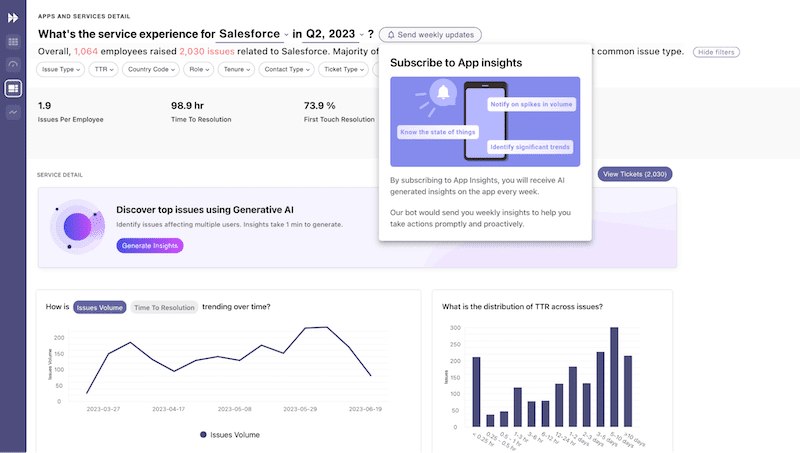
Moveworks is built for automating internal IT and HR workflows. It intelligently resolves tickets, handles FAQs, and speeds up employee tasks. The assistant works within tools like Slack and Microsoft Teams. Perfect for improving operational efficiency in large teams.
Key Focus
- AI for internal support, IT, HR, and employee experience automation.
Key Features
- AI Issue Resolution
- Collaboration Platform Integration
- Machine Learning Optimization
- Workflow Automation
- Quick response to repetitive employee issues.
- Improves internal team satisfaction and speed.
- Reduces IT workload significantly.
- Not designed for external customer support.
- Limited flexibility outside IT/HR use cases.
- Check for multilingual support if you serve global customers. A good assistant should handle accents, dialects, and multiple languages seamlessly. Go for the software that is feasible for your business.
5. Kore.ai Experience Optimization (XO) Platform
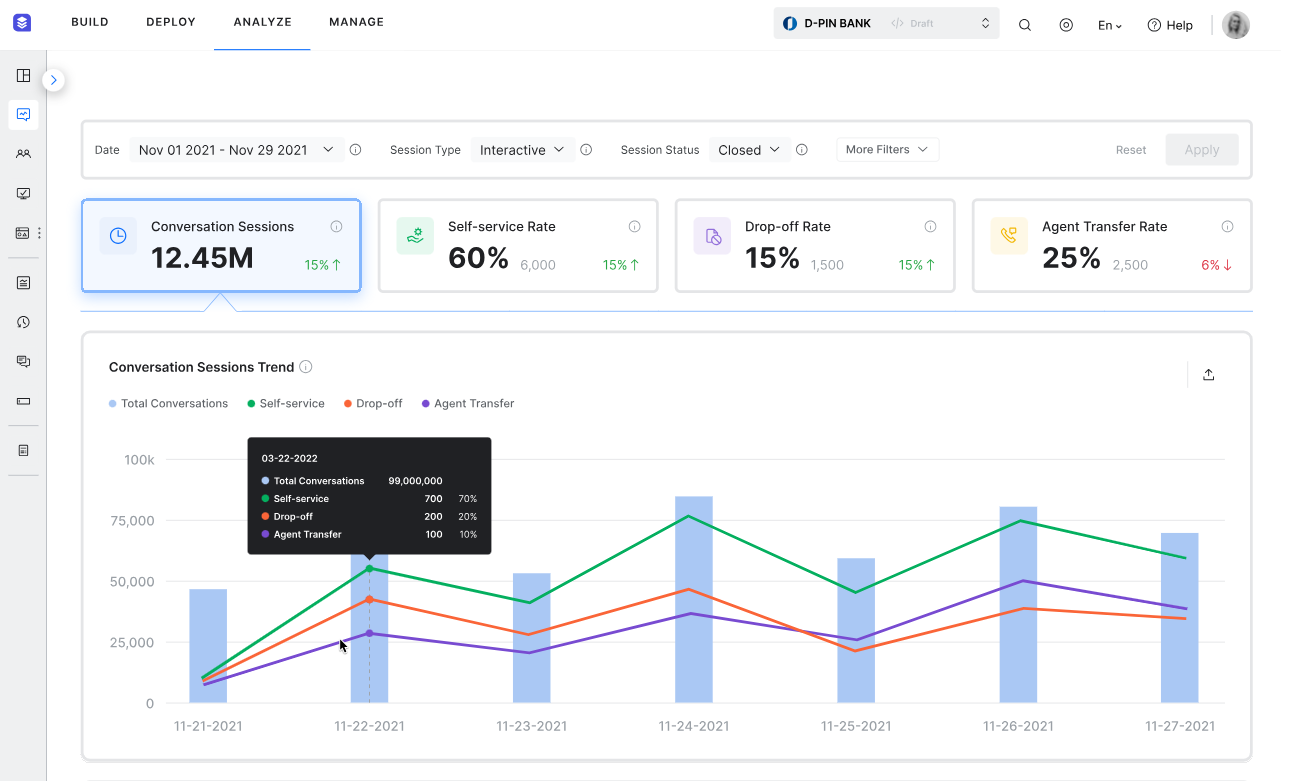
Kore.ai XO helps businesses create AI assistants across all departments. It supports chat, voice, and messaging channels with powerful NLP. The platform also offers templates for banking, healthcare, and more. Best suited for companies needing end-to-end conversational AI platform.
Key Focus
- Enterprise-wide AI automation across departments and industries.
Key Features
- Omnichannel Experience
- Domain-Specific Templates
- Natural Language Processing (NLP) Engine
- Bot Builder Studio
- Works for customer and employee use cases.
- Offers prebuilt solutions for faster deployment.
- Highly customizable with automation options.
- Requires time to master all features.
- There is a complex pricing structure for smaller teams.
Benefits of Using AI Virtual Assistants
Adopting an AI-powered virtual assistant comes with a variety of benefits that can enhance both personal and business operations. Here are some of the key advantages:
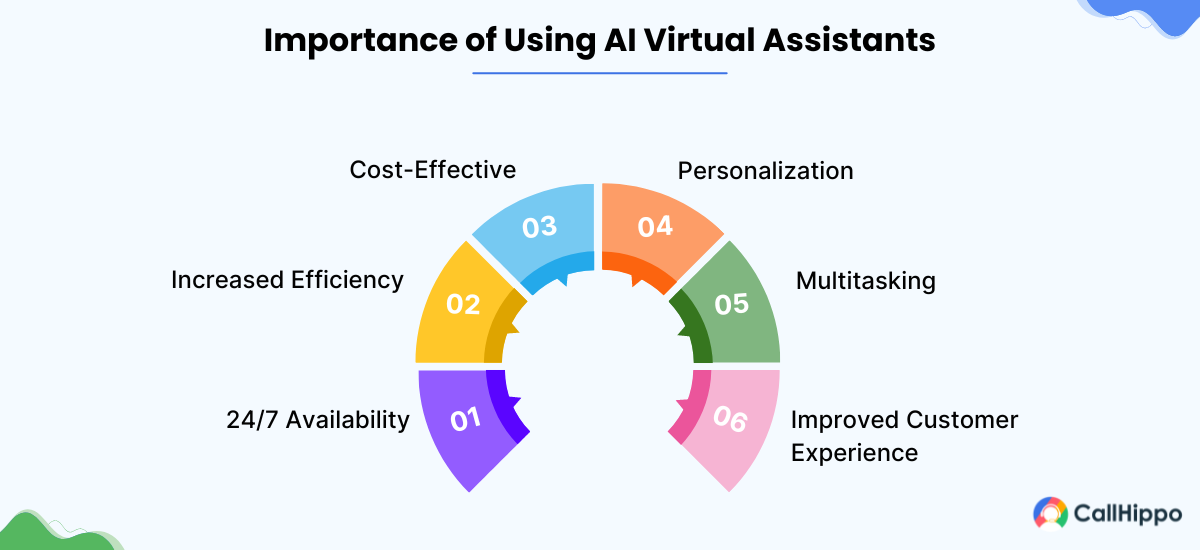
1. 24/7 Availability
One of the most significant advantages of an AI digital assistant is its ability to provide around-the-clock service. Unlike human employees who require breaks, sleep, or time off, an AI-powered virtual assistant can be available 24/7. This is especially beneficial for businesses that operate globally or have customers across different time zones.
- For businesses: An AI voice assistant can handle customer service queries, providing real-time support regardless of the hour. This ensures that customers always receive timely responses, improving customer service and retention,
- For individuals: Personal users can rely on these assistants at any time of day to set reminders, search for information, or manage tasks, making their lives easier and more organized.
In industries like healthcare, having access to a virtual assistant 24/7 can be lifesaving, allowing patients to schedule appointments, receive reminders for medication, or even get critical health information in the middle of the night.
2. Increased Efficiency
AI-powered virtual assistants excel at handling routine and repetitive tasks that can often take up a lot of time when performed manually. Tasks such as scheduling meetings, sending reminders, answering frequently asked questions (FAQs), and processing basic customer requests are easily managed by these systems. By automating these functions, businesses can fully leverage the benefits of AI virtual assistants, enabling them to focus on more complex, higher-priority activities.
- For businesses: Efficiency gains are seen through streamlined workflows. Customer inquiries that don’t require human intervention can be handled by an AI virtual assistant, reducing wait times and ensuring consistent service delivery.
- For individuals: Daily task management becomes significantly easier. Virtual assistants can help individuals stay organized by setting reminders, managing calendars, and automating task lists without the need for constant manual input.
Incorporating an AI-based virtual assistant can lead to measurable productivity gains, as it reduces human error, minimizes downtime, and handles monotonous tasks more swiftly than humans.
3. Cost-Effective
One of the most appealing aspects of AI virtual assistants for small businesses is their ability to cut costs. By automating routine operations, companies can reduce their reliance on human workers for simple and repetitive tasks. This can result in significant savings, especially for businesses with high volumes of customer interactions.
- For businesses: In sectors like customer service or tech support, employing an AI voice assistant can reduce the need for a large customer service team. While human agents are still essential for more complex queries, many basic issues can be resolved through an AI system, enabling companies to operate more leanly.
- For individuals: Although the primary cost-saving benefits apply to businesses, personal users can also reduce expenses by relying on AI virtual assistant apps to manage tasks like shopping, budgeting, and even travel planning, which can help avoid the need for costly personal assistants or professional services.
Beyond labour savings, AI-powered virtual assistants also cut costs by reducing errors, optimizing time management, and enhancing resource utilization.
4. Personalization
AI-based virtual assistants are equipped with machine-learning algorithms that enable them to learn from user interactions. This continuous learning allows these assistants to adapt to individual preferences over time, offering personalized responses and solutions.
- For businesses: Personalization is key in customer service and sales. An AI-powered virtual assistant can analyze past interactions with customers and provide recommendations based on their preferences, improving the customer experience and increasing the likelihood of repeat business. AI systems can even suggest personalized marketing offers based on customer behaviour and preferences, helping businesses generate more revenue.
- For individuals: Virtual assistants can learn a user’s daily routines, preferred communication methods, and favourite activities. This means that over time, they can provide more tailored recommendations, like suggesting new music, adjusting smart home settings, or recommending workout routines. This makes personal task management smoother and more enjoyable.
By learning from data, AI digital assistants can also anticipate user needs before they are explicitly mentioned, further enhancing user satisfaction.
5. Multitasking
Unlike humans, AI virtual assistants can manage multiple tasks at the same time without getting overwhelmed. This multitasking ability enables users to complete several operations concurrently, significantly boosting productivity.
- For businesses: In an office environment, the best AI virtual assistant can simultaneously manage emails, organize calendars, set up meetings, and send notifications, ensuring that no detail is overlooked. It can also monitor various workflows in the background, providing real-time updates and insights, which makes it an invaluable asset for project management and coordination.
- For individuals: A personal AI-powered virtual assistant can handle diverse tasks like sending emails while setting reminders or checking the weather, all while the user focuses on more important tasks. This ability to multitask enhances the convenience and efficiency of day-to-day operations.
In more advanced applications, AI virtual assistants can manage entire ecosystems, such as a smart home setup, where it controls lights, appliances, and security systems, ensuring that everything operates smoothly in the background.
6. Improved Customer Experience
In customer-facing roles, AI-powered virtual assistants play a crucial role in improving customer experience. Their ability to quickly access and process large amounts of data allows them to provide faster and more accurate responses than a human might, especially when dealing with FAQs.
- For businesses: Customers now expect quick and seamless interactions with companies. Irrespective of business size, with an AI virtual assistant for small business, customers now expect quick and seamless interactions with companies. Moreover, AI virtual assistants can handle a higher volume of requests simultaneously, which is particularly important during peak times, like the holiday shopping season.
- For individuals: AI-based virtual assistants provide an efficient, easy-to-use interface for handling day-to-day tasks, making technology more accessible and responsive to user needs.
AI Virtual Assistants Use Cases in Different Industries
The applications of AI-powered virtual assistants span across a wide range of industries, each benefiting from their unique features and capabilities.
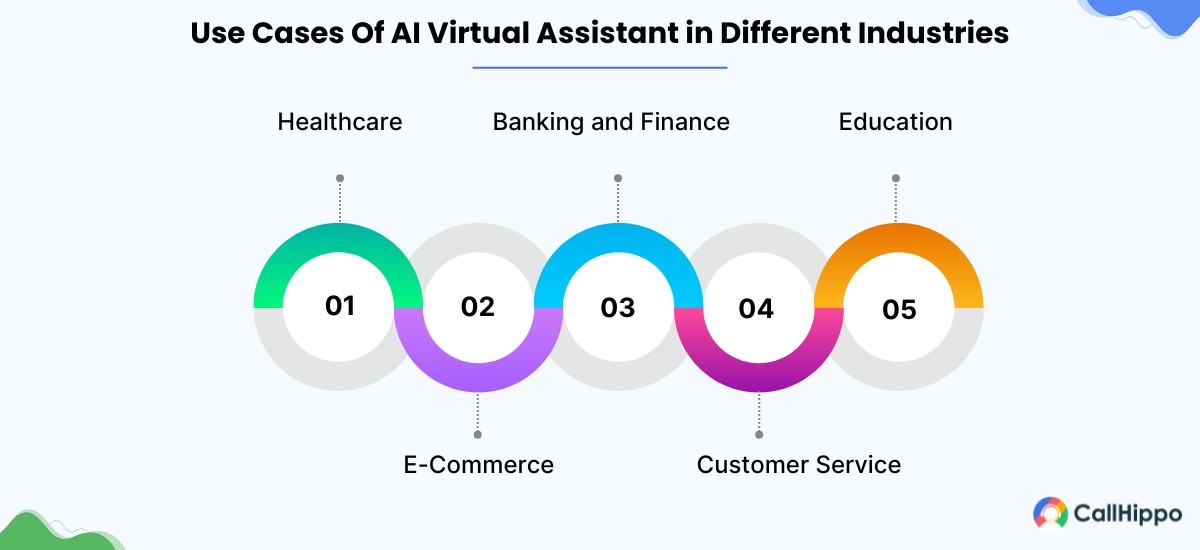
1. Healthcare
AI virtual assistants are transforming the healthcare industry by providing solutions that streamline patient care, improve operational efficiency, and assist medical professionals. In a sector where time, accuracy, and accessibility are critical, virtual assistants offer significant advantages.
One of the most common uses of AI-powered virtual assistants in healthcare is automating appointment bookings. Patients can interact with a virtual assistant to schedule, reschedule, or cancel appointments via voice or text without the need for human intervention.
AI digital assistants are also used to provide reminders for patients to take their medications. This can significantly reduce medication non-adherence, especially for elderly patients or those managing multiple prescriptions.
Example: MyTherapy is an AI-based app that reminds patients to take their medications on time and keeps track of their treatment plan.
2. E-Commerce
In the fast-paced world of e-commerce, AI virtual assistants are a game-changer for improving customer engagement, enhancing the shopping experience, and driving conversions. From personalizing the shopping journey to providing round-the-clock customer support, AI is reshaping the retail landscape.
One of the primary roles of AI virtual assistants in e-commerce is to handle customer service queries. These assistants can provide real-time answers to frequently asked questions (FAQs), such as product availability, shipping times, or return policies.
Example: H&M uses a chatbot on its website to help customers find products, track orders, and navigate through the online store. This AI assistant allows users to receive instant answers without waiting for human support.
3. Banking and Finance
The banking and finance sectors are rapidly adopting AI-powered virtual assistants to enhance customer service, streamline operations, and provide personalized financial guidance. Virtual assistants in finance can handle tasks ranging from basic account management to more complex financial planning.
One of the most common uses of AI-based virtual assistants in banking is managing user accounts. Customers can use AI systems to check their balances, review transaction history, and receive updates on account activities.
Example: Bank of America’s virtual assistant, Erica, allows customers to check their balances, pay bills, and transfer funds through voice commands or text messages. Erica can also provide financial insights, helping users manage their spending more effectively.
4. Customer Service
AI-powered virtual assistants are revolutionizing customer service by providing instant responses, improving the quality of support, and reducing operational costs. From answering simple queries to solving complex problems, AI assistants help businesses improve their customer service processes significantly.
One of the most common roles of AI voice assistants in customer service is handling frequently asked questions (FAQs). Virtual assistants can provide instant answers to routine inquiries, reducing the burden on human agents and speeding up response times.
Example: Sephora’s chatbot on Facebook Messenger helps customers with product inquiries, such as finding the right makeup, skincare products, or gift ideas. This AI assistant is available 24/7, enhancing customer satisfaction.
5. Education
In the education sector, AI-based virtual assistants are proving to be invaluable tools for both students and educators. These assistants can personalize learning experiences, provide instant feedback, and even serve as virtual tutors, enhancing the educational process for all involved.
AI virtual assistants can create personalized learning paths for students by analyzing their performance, preferences, and learning pace. This ensures that students receive the right resources and support based on their unique needs.
Example: Squirrel AI uses AI to provide personalized learning experiences for students. It adjusts the curriculum based on student performance, helping them focus on areas where they need improvement.
CallHippo AI
- Advanced Call Analytics
- AI Sentiment Analysis
- Omnichannel Support

How AI Virtual Assistants Work?
The technology behind an AI-based virtual assistant is complex yet fascinating. It involves several components working together to simulate human intelligence.
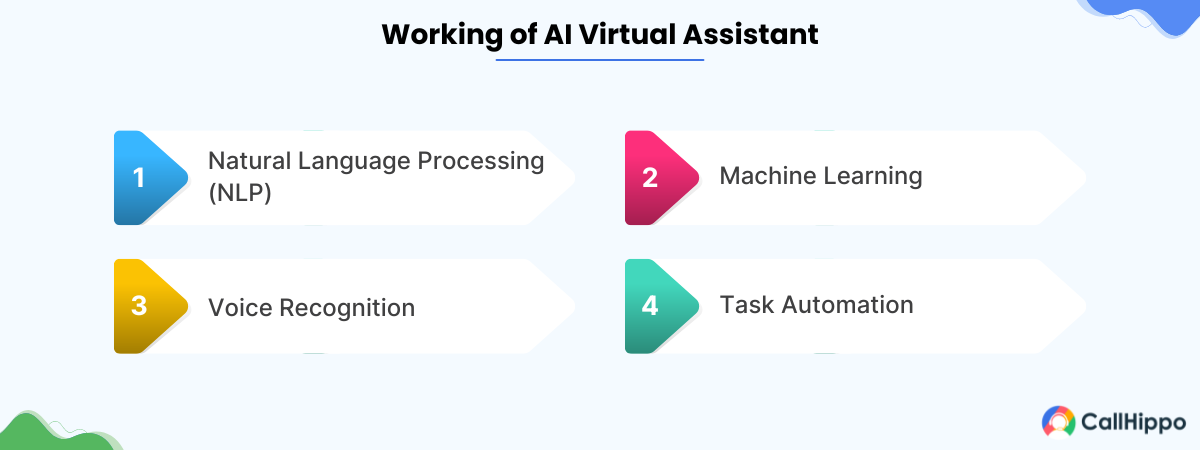
1. Natural Language Processing (NLP)
NLP is the backbone of any AI digital assistant. It allows the assistant to understand and interpret human language, transforming voice or text commands into actionable responses.
2. Machine Learning
Machine learning enables AI virtual assistants to learn from user interactions, improving their responses over time. By analyzing data, they can better predict user needs and preferences.
3. Voice Recognition
Voice-based assistants, like Alexa and Google Assistant, use voice recognition to understand commands and respond verbally. AI voice assistants are now capable of distinguishing between different users, providing personalized responses.
4. Task Automation
AI virtual assistants can automate various tasks like setting reminders, making calls, sending texts, and managing emails, all without human intervention.
Factors To Consider While Choosing the Right AI Assistant
Choosing the right AI virtual assistant app for your needs requires careful consideration. Here are a few factors to keep in mind:
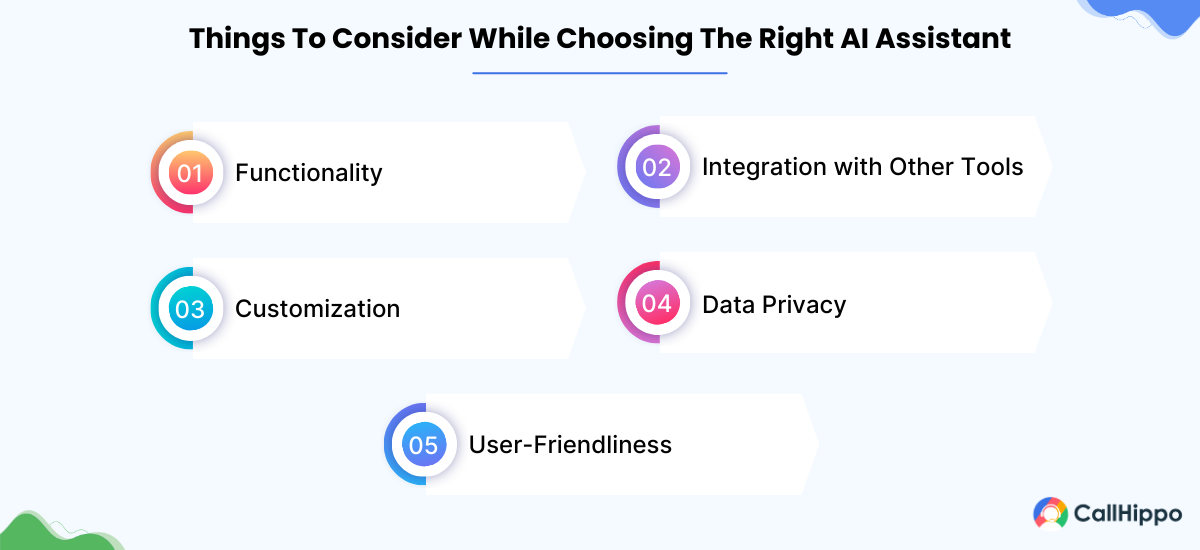
1. Functionality
The primary consideration when selecting an AI-based virtual assistant is its functionality. Different virtual assistants excel in various areas, so it’s important to identify the specific tasks you want the assistant to perform. Ask yourself what problems you need the assistant to solve, and choose accordingly.
If you’re in a specialized field, such as healthcare, finance, or education, some assistants are better suited for industry-specific tasks. In healthcare, for example, an AI assistant may help with scheduling patient appointments, while in finance, it might provide insights into account balances or recent transactions.
2. Integration with Other Tools
Another critical factor is how well the AI virtual assistant app integrates with the tools and platforms you already use. Seamless integration with your existing software ecosystem ensures smooth workflows and enhances productivity.
Consider whether the virtual assistant supports third-party apps or APIs that you use regularly. Many assistants, such as Alexa, have expansive “skills” or app ecosystems that enable additional functionalities, such as ordering food, booking rides, or controlling IoT devices.
3. Customization
The ability to customize the assistant to fit your specific needs is another crucial factor to consider. A truly effective AI-powered virtual assistant should adapt to your preferences, learning over time and offering personalized solutions.
Some assistants allow you to create custom commands or shortcuts that automate multi-step processes. For instance, Siri Shortcuts enable users to customize specific actions and chain tasks together, making workflows more efficient.
4. Data Privacy
As AI digital assistants often handle sensitive information, such as financial data, emails, and personal conversations, data privacy should be a top priority. Make sure that the AI assistant you choose adheres to stringent data security and privacy standards.
Ensure that the assistant encrypts your data and stores it securely, preventing unauthorized access. It’s also important to know whether your data is stored locally or on cloud servers, and whether you can control how and when it is shared.
5. User-Friendliness
Ease of use is one of the most important factors to consider. A well-designed, intuitive interface can make interacting with an AI-powered virtual assistant a seamless and enjoyable experience. On the other hand, a complex or confusing interface may hinder productivity and deter usage.
If the assistant relies on voice input, ensure that its voice recognition technology is accurate and efficient, especially if you have an accent or speak in multiple languages. Assistants like Google Assistant and Alexa are known for their strong voice recognition abilities, offering support for multiple languages and dialects.
Conclusion
As AI continues to evolve, the role of AI virtual assistants is expected to grow in both personal and professional contexts. From automating tasks to providing personalized experiences, these digital helpers are transforming the way we interact with technology.
Whether you’re looking for the best AI virtual assistant to improve efficiency in your business or simply make daily tasks easier, it’s essential to choose the right one for your specific needs. Keep the factors we discussed in mind, and you’ll be well on your way to leveraging the power of an AI-powered virtual assistant.
FAQs
1. What does an AI virtual assistant do?
An AI virtual assistant helps automate tasks like scheduling, answering queries, setting reminders, and managing smart devices using voice or text commands.
2. How much does an AI virtual assistant cost?
Costs vary widely; basic versions are often free, while advanced or business-focused assistants may have subscription fees or one-time payments.
3. Is ChatGPT a virtual assistant?
Yes, ChatGPT can function as a virtual assistant by answering questions, generating content, and providing task-related support, but it lacks voice command features typical of other assistants.
4. Can I use ChatGPT as a personal assistant?
Yes, ChatGPT can be used as a personal assistant for tasks like drafting emails, setting reminders, providing information, or helping with planning.

Subscribe to our newsletter & never miss our latest news and promotions.
